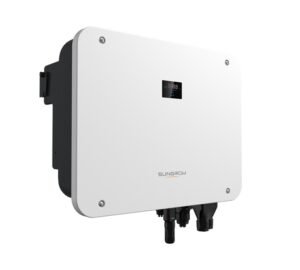Hybrid inverters are integral components of modern solar energy systems, efficiently managing electricity from solar panels, batteries, and the grid. In the realm of residential and commercial solar installations, the choice between single-phase and three-phase hybrid inverters is crucial. Each type offers distinct advantages depending on the application. This blog post explores the differences between single-phase and three-phase hybrid inverters and introduces Sungrow‘s innovative solutions for both configurations.

## Single-Phase Hybrid Inverters
### Key Characteristics:
– **Voltage and Power Handling**: Single-phase inverters operate on a single line of AC power, typically at 120-240 volts. They are commonly used in residential settings where the energy demands are relatively low.
– **Simplicity and Cost**: These inverters are generally simpler in design and less expensive than their three-phase counterparts, making them a popular choice for home use.
– **Load Balancing**: Single-phase inverters can sometimes lead to issues with load balancing, as they supply power through one phase, which can cause an uneven distribution of electricity, especially when high-power appliances are involved.
## Three-Phase Hybrid Inverters
### Key Characteristics:
– **Voltage and Power Handling**: These inverters operate across three lines of AC power, typically at 208-480 volts, which allows them to handle higher power loads and provide a more stable power supply.
– **Efficiency at High Loads**: The ability to spread the electrical load across three phases reduces the chance of overload on any single phase and enhances overall system efficiency.
– **Complexity and Cost**: Three-phase inverters are more complex and typically more expensive, reflecting their enhanced capabilities and the larger-scale applications they support.
## Choosing Between Single-Phase and Three-Phase
The choice between a single-phase and a three-phase hybrid inverter largely depends on the scale of the installation and the electrical requirements of the property. Single-phase inverters are sufficient for most residential homes, while three-phase inverters are necessary for higher load demands typical of commercial or industrial settings.
## Sungrow’s Hybrid Inverter Solutions
When selecting a hybrid inverter, it’s crucial to choose a manufacturer that not only provides high-quality products but also offers a range of options to suit different needs. Sungrow, a leading provider in the solar technology market, offers innovative and reliable single-phase and three-phase hybrid inverters that cater to a broad spectrum of energy requirements.
### Why Sungrow?
– **Versatility**: Sungrow offers a comprehensive range of inverters, ensuring there’s a perfect match for any application—be it residential, commercial, or industrial.
– **Innovation and Reliability**: With a strong focus on R&D, Sungrow continuously innovates to provide the most efficient, reliable, and user-friendly solar energy solutions.
– **Global Presence and Expertise**: Operating globally, Sungrow brings a wealth of experience and a proven track record of success in diverse markets and environments.
– **Support and Service**: Sungrow stands out for its customer-centric approach, offering excellent service and support, and ensuring that clients get the most out of their solar investments.
## Conclusion
Whether you need a single-phase inverter for a residential home or a three-phase inverter for a commercial project, understanding the key differences and applications can help you make an informed decision. With Sungrow’s extensive lineup of both single-phase and three-phase hybrid inverters, you’re equipped not just to meet but exceed your solar energy expectations. Explore Sungrow’s offerings to find the optimal solar solution tailored to your energy needs, backed by industry-leading technology and support.











